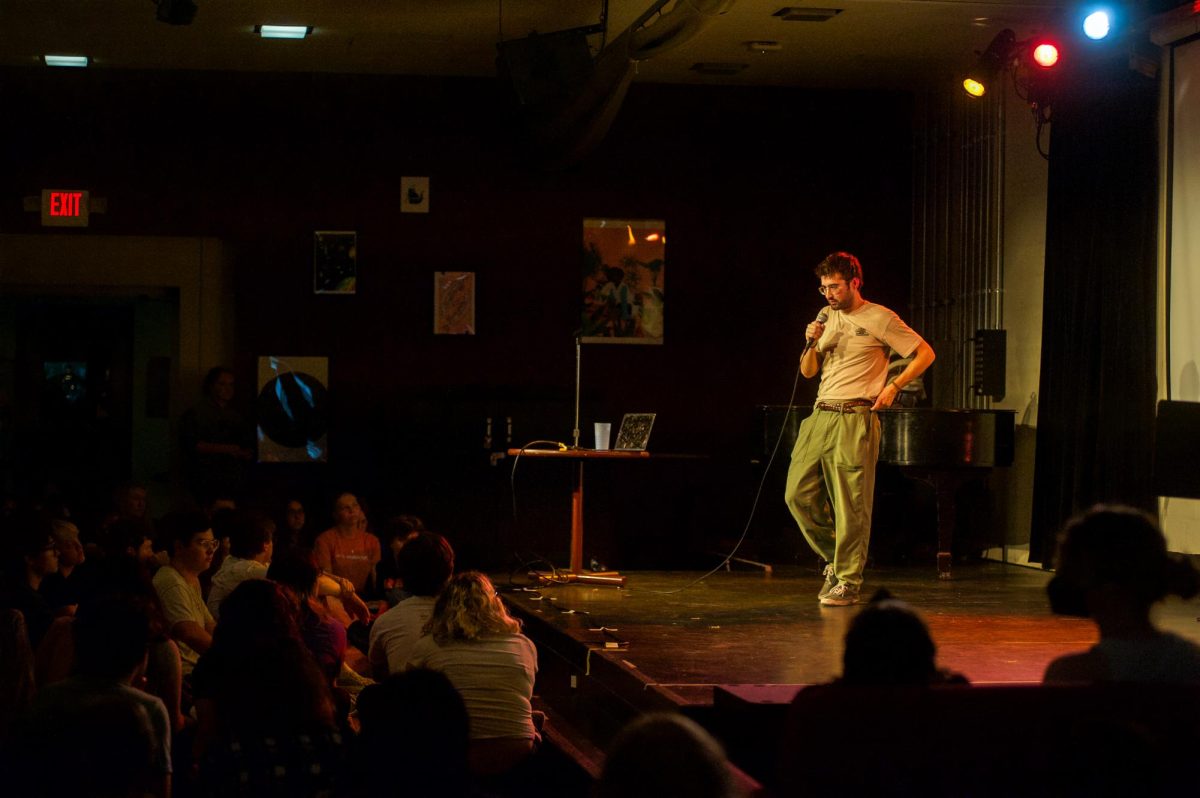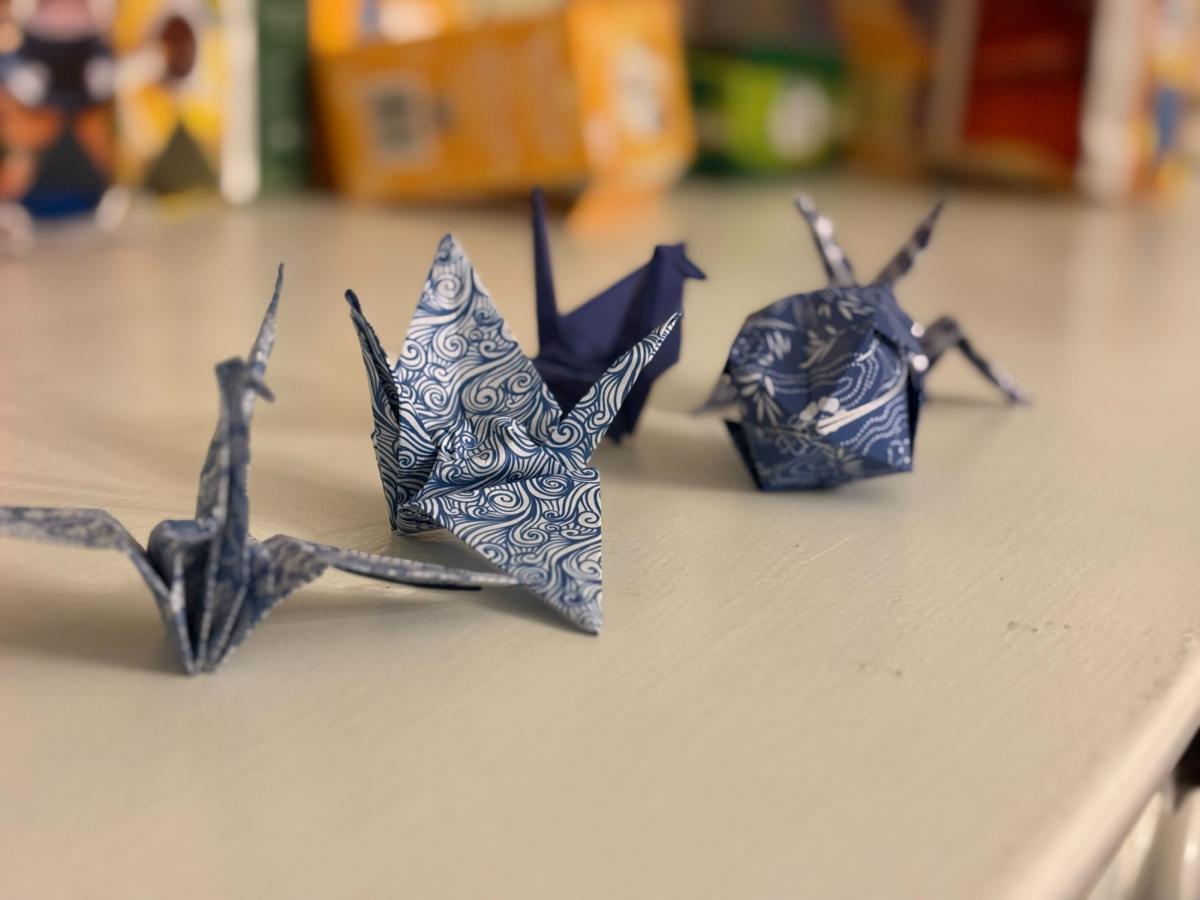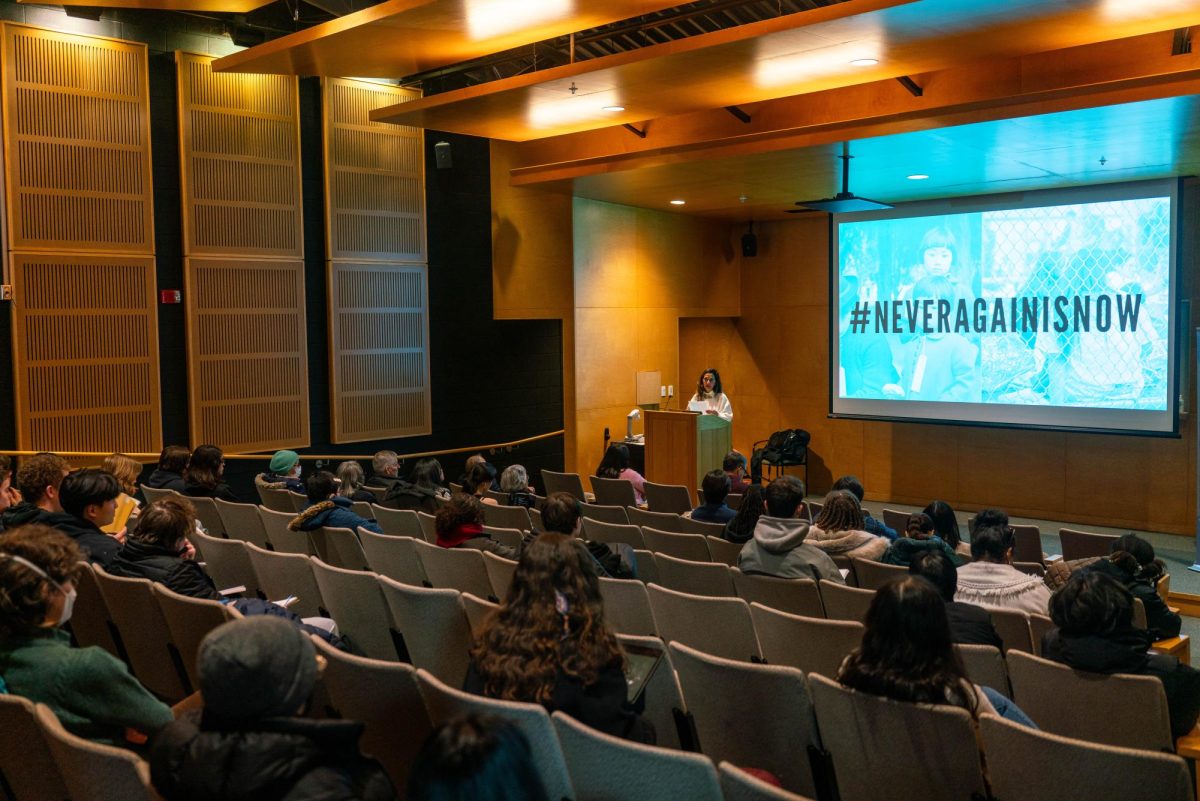On Wednesday at 5:30 p.m., over 300 members of the Oberlin community packed themselves into the Cat in the Cream to hear a talk titled “Social Media is Changing the Way You Speak.” The speaker, Adam Aleksic, is more commonly known across social media platforms as The Etymology Nerd, where he has amassed 1.3 million followers on Instagram and over 620 thousand followers on TikTok. He gained popularity by posting short-form educational videos on topics ranging from the etymology of “skibidi” to constructed languages based off of birds. He is well-recognized by his shaky, selfie-style videos where he talks in a rapid, emphatic clip accompanied by lots of gestures. This same energy was emulated in his talk, except for the shaky hands.
Leading up to the presentation, the excitement outside the Cat was palpable, with a line stretching out the door toward West Lorain Street. At the front of this line was College first-year Isabella Moss.
“I’ve been here since 3:30 p.m.,” Moss said. “I wanted to get a good seat.”
Available seats were almost entirely on the floor, as the tables that normally fill the Cat were cleared out to make room. Still, there wasn’t enough space to fit the overwhelming amount of students interested.
“We had to make people stand outside and listen in,” College fourth-year Dan-Ha Le, a student worker at the Cat, wrote to the Review. “They couldn’t enter because the Cat was at capacity.”
Moss and the students in line behind them weren’t the only ones who had been anxiously awaiting this event. Andy Roshal, College third-year and president of the Oberlin Linguistics Society, indicated that the talk had been in the works since last semester.
“It’s been so many emails since March — I think my inbox and Adam’s inbox were both very full of them,” Roshal said. “There were a lot of moving pieces, and we’re very happy that it all worked out in the end.”
One piece, however, had always been set in stone: the topic of the talk.
“I just finished writing a book about how social media is changing language, so it’s very much on my mind,” Aleksic said. “As a linguist and a content creator, it’s definitely something I deal with everyday — thinking about how language is used online, how my own language choices online are constrained, and how I’m potentially shaping other people’s language choices.”
He also said that he has delivered iterations of this talk at other institutions, including Georgetown University, University of Pennsylvania, and Stanford University.
“There are always things changing, and I discover new things, so I did definitely update the slides since the last time I was at Stanford in May,” he said. “I put in an Ohio meme here.”
Aleksic indicated that he loves talking to college students, which was evident before the presentation when he sat on the stage and chatted with attendees on the ground below. He asked the name of everyone he talked to, signed posters, and took photobooth selfies on laptops.
The talk itself touched on new words and spellings that have evolved due to attempts to evade TikTok censorship, such as “unalive” and “seggs,” as well as exploring how deeply ingrained these new words have become outside of the cybersphere. Beyond that, he discussed how algorithms change what words proliferate within our society and how accents are changing because of new social media trends. While he focused heavily on etymology and the linguistic implications of social media trends, he was sure to acknowledge the sociological consequences of these linguistic shifts, especially when slang is coming from minority groups. He explored the implications of the spread of words from subcultures like the incel community and recognized the power of language coming directly from African American Vernacular English. He referred to the famous Weinrich witticism, “a language is a dialect with an army and a navy,” highlighting the power of Western, elite institutions in the linguistic sphere and the role we all play in perpetuating these power dynamics.
“I don’t think people should ever say ‘This is how language should be regulated,’” Aleksic said. “However harmful it may be, it’s inevitable that words get appropriated from different communities. … That’s just the cycle of how humans communicate.”
Throughout his talk, Aleksic continually returned to the idea of language evolving more rapidly due to social media. But does the internet’s influence on our language mean that we’re “cooked”?
“I don’t think we’re necessarily cooked,” Aleksic said.
He went on to quote Chaucer.
“You know that the form of speech will change within a thousand years, and words that were once apt we now regard as quaint and strange, and yet they still spoke them thus and succeeded as well in love as men do now,” Aleksic said. “That’s what humans do — we change words. … I don’t think it’s that bad.”
In both his talk and in responding to student questions, Aleksic highlighted the interdisciplinary nature of linguistics with a reassuring tone. The world is not coming to an end, it’s evolving.
“I think it’s good to know about these words and about how etymology works because it helps us understand social processes and culture and who we are as a society,” he said. “Using language as a lens for that is really useful.”
Throughout the talk, the crowd in the Cat paid close attention, laughing along at his jokes and greeting the end with roaring applause.
“I’m really happy with the event,” Roshal wrote in an email to the Review. “Adam’s talk was equal parts informative and entertaining, and it seems like everyone was engaged and having a great time. Adam’s a fantastic speaker.”
The 40-minute lecture was followed by a 50-minute Q&A session. When Roshal brought the event to a close at 7 p.m., a small swarm of students migrated to the stage to ask for more answers, signatures, and photos.
“I didn’t expect this level of excitement, but it was really amazing to see such incredible turnout at the event,” Aleksic wrote to the Review. “I started making this content because I felt like it was missing on the internet, and I’m glad people agree. It’s really cool whenever someone tells me that I got them more into linguistics, so I’m definitely happy about it.”
The event was co-sponsored by the OLS and the Anthropology department. There is no Linguistics major or department at Oberlin, and the OLS — formerly Society for Kids who Want Oberlin to have a Real Linguistics Society — does what it can to support students who are interested in developing an individual major in Linguistics or pursuing linguistics in a less formal setting.
“It’s so exciting, and a little overwhelming, that so many people came to this event sponsored by our little club that plays Bananagrams and Pirate Scrabble in Wilder [Hall] every weekend,” Roshal wrote.
The OLS meets every Saturday from 1–3 p.m. in Wilder Hall, room 208. While Aleksic won’t be here every week, the S.K.W.O.R.L.S. will be sticking around for anyone interested in getting involved in linguistics.












